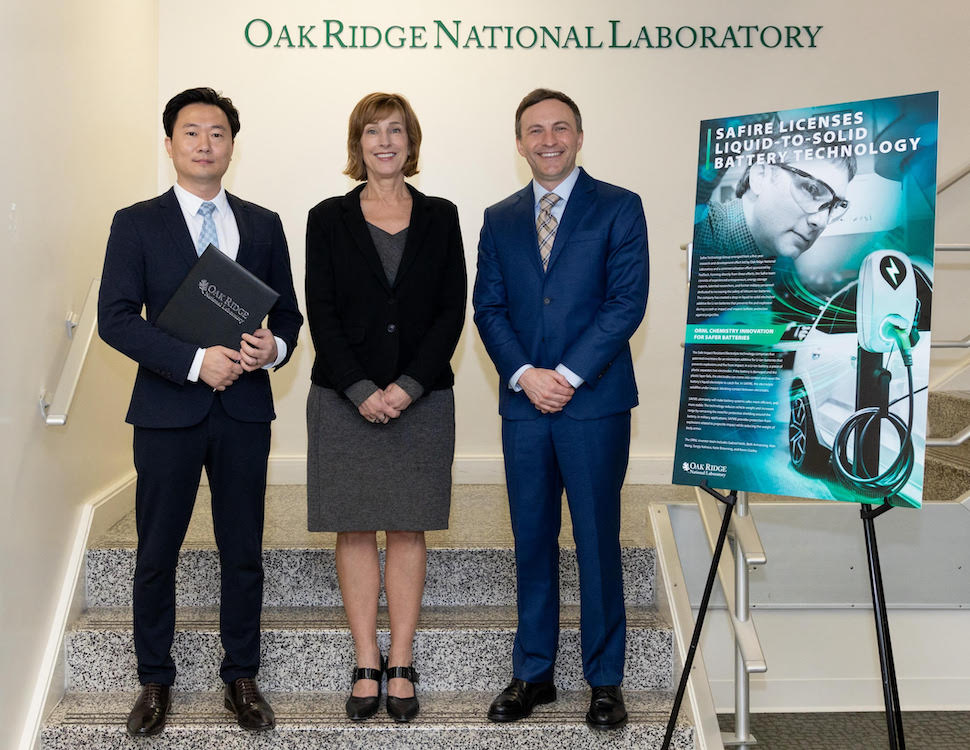When Safire Technology cofounder Mike Grubbs describes the technology of his startup, he turns to an unanticipated source: a cornstarch and water mixture.
“Upon an impact, cornstarch and water change from a liquid to a solid instantaneously,” Grubbs told Technical.ly. “What the Safire technology does is the additive that goes into that, liquid electrolyte, for the lithium-ion battery, it has the same effect. On an impact, it instantaneously changes from a liquid to a solid.”
In the everyday world, that idea can be used within a sector that’s growing in popularity — electric vehicles (EVs) — to prevent fires and explosions.
Grubbs and cofounder John Lee learned about the technology through DC’s Fedtech Startup Studio in 2020, which is when they created Safire. The technology itself, invented at the Oak Ridge National Laboratory in Tennessee, is an additive of a liquid electrolyte, which changes from a liquid to a solid on impact. When an electrolyte is in a solid state, Grubbs said, it shuts off any energy transport happening in the battery — meaning there can’t be any thermal runaway that creates fires and explosions. The company is currently headquartered in Tysons, Virginia and plans to open an office in Knoxville, Tennessee.
The technology, Grubbs thinks, is crucial given that EVs and hybrids are catching fire in accidents. According to data from the Bureau of Transportation Statistics and the National Transportation Safety Board, hybrid vehicles caught fire at a rate of 3,474.5 per 100,000 cars and EVs at 25.1 (combustion engines were at a rate of 1,529.9).
“It’s a problem because they’re all preventable during crashes and impacts,” Grubbs said.
Safire, the company, just received an exclusive licensing agreement with the laboratory to commercialize SAFIRE, the product. Grubbs said it’s the first patented and proprietary drop-in safety additive that’s been invented for lithium-ion batteries at the lab.
For the company, that means it can begin prototyping and exploring commercial opportunities, as well as generally improve the safety of electric vehicles.
“With this agreement, we’re one step closer to increasing car safety,” Grubbs said.
Getting the battery technology into EVs, Grubbs hopes, will mean more people will be open to buying EVs. But the technology can apply to more than just EVs and hybrids, as it can work in any kind of lithium-ion battery. He also sees it applying to e-bikes and even aircraft; The company is currently looking at various applications for the military.
With the new license agreement, Grubbs hopes to seek prototyping opportunities for the company. After that, he said he’ll be looking to build out the R&D staff and do some fundraising (the company has raised some capital, but Grubbs declined to give details). Eventually, he’d like to see all vehicle batteries with a Safire stamp to ensure safety, in the same vein as Intel in the early computer days.
But mostly, he hopes that Safire can help increase the safety of drivers across the country.
“I hope that nobody ever has to die or get injured again because of a fire or explosion in an EV car because of a lithium-ion battery,” Grubbs said. “That’s why we’re doing this, and we really believe that with the move to electrification, if we can make a safer battery, we can make a safer world.”







